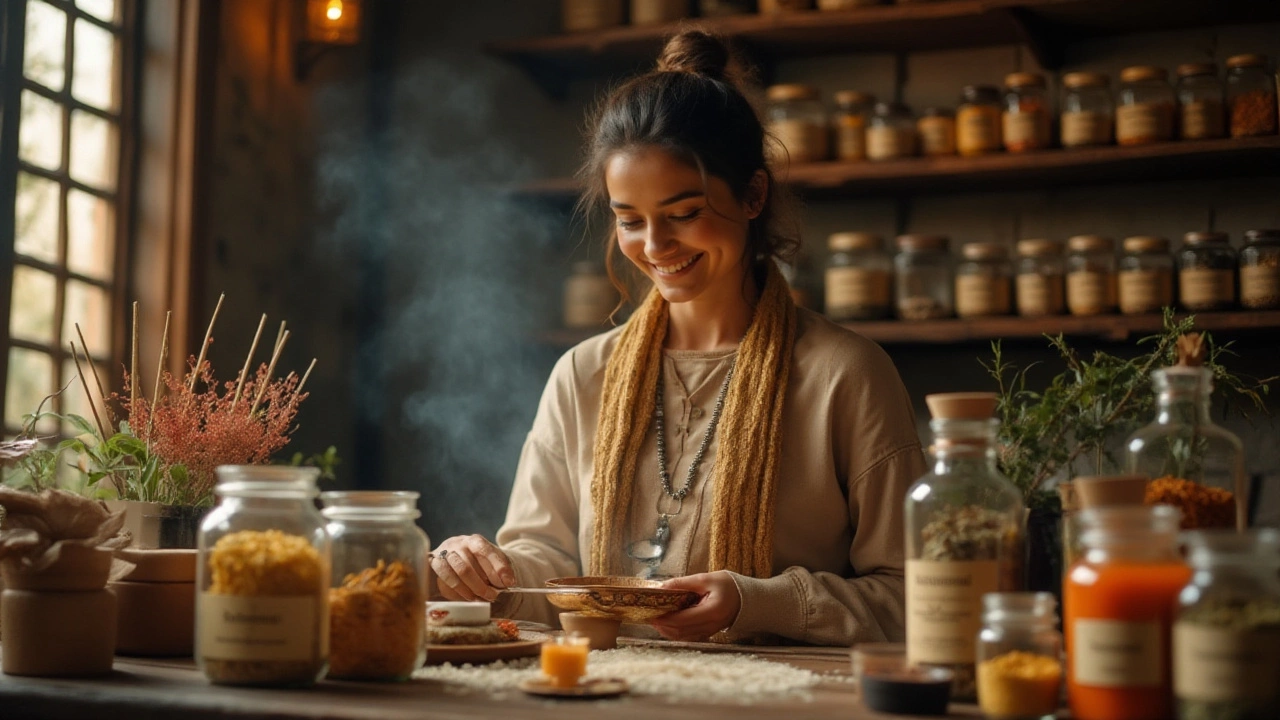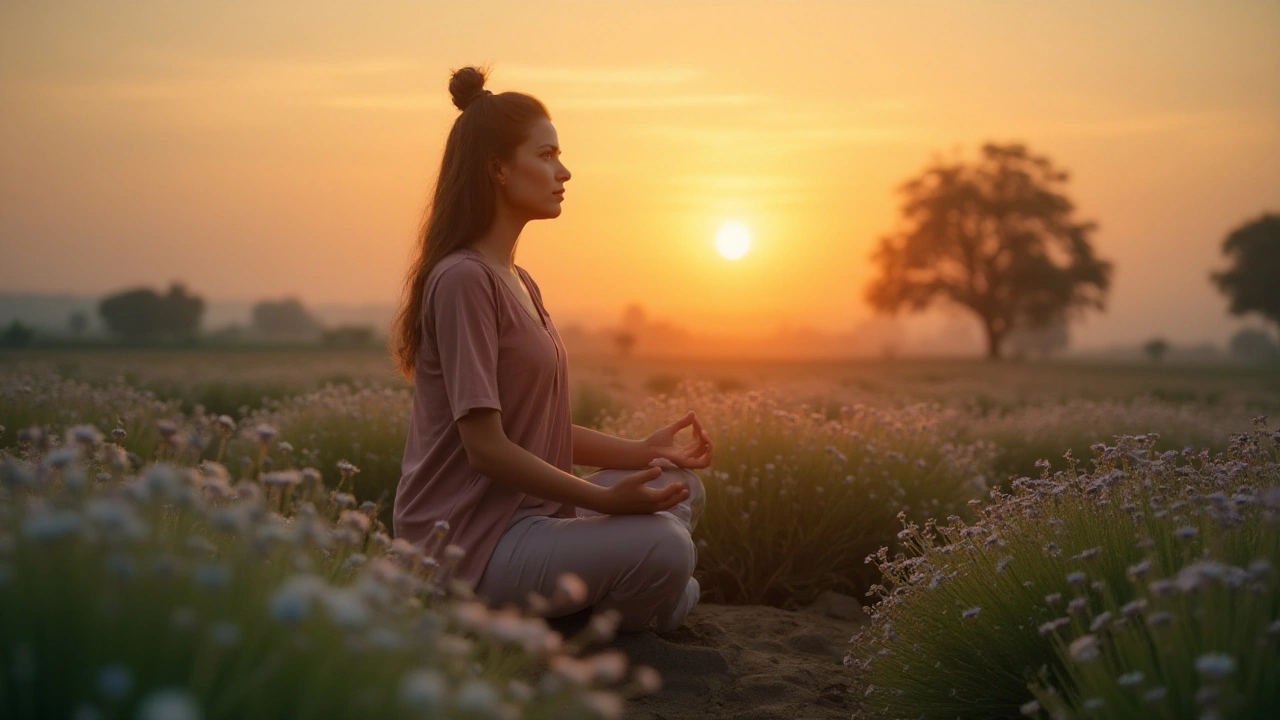Discovering the Most Effective Herbal Remedy for Anxiety
 Jan, 26 2025
Jan, 26 2025
In a world racing at hyper-speed, anxiety has carved a niche in the lives of many. While conventional medicine offers various solutions, a growing number of individuals are turning to the wisdom of nature. Herbal remedies have long whispered promises of peace and tranquility to those willing to listen.
These green wonders are steeped in history, and many have stood the test of time as potential allies against anxiety. In this exploration, we dive deep into the potent world of anti-anxiety herbs, seeking to unveil which of them possesses the power to quiet the storm within.
With a mix of folklore and modern science, the journey to discover the strongest anti-anxiety herb invites both the curious newcomer and the seasoned herbal enthusiast.
- Understanding Anxiety
- Historical Use of Herbal Remedies
- Top Anti-Anxiety Herbs
- Science Behind Herbal Supplements
- Safety and Considerations
- Practical Tips for Usage
Understanding Anxiety
Anxiety, in its true essence, is both universal and personal, a complex cocktail of emotions that affects individuals differently. It's a blend of apprehension, unease, and dread, created in the mind and radiating through the body like ripples on a lake. At its core, anxiety is an evolutionary defense mechanism, alerting us to danger—or perceived threats—thereby preparing us for fight or flight. Yet, in today’s fast-paced, continuously connected world, this ally can morph into a relentless enemy, affecting the quality of life for millions worldwide. The resonating drumbeat of deadlines, expectations, and uncertainty contributes to anxiety becoming one of the leading mental health issues we face today.
Biologically, anxiety stems from the limbic system, a set of structures in the brain where our strongest emotions are born. This system governs emotional responses, creating a dialogue of signals that trigger the release of hormones like adrenaline and cortisol. These are supposed to prepare our bodies for immediate action, yet prolonged exposure without physical exertion results in an array of symptoms. Common manifestations include rapid heartbeat, sweating, restlessness, and a constant sense of worry, leaving individuals in a perpetual state of high alert. Anxiety disorders surface when these symptoms persist and disrupt daily activities, leading to conditions such as Generalized Anxiety Disorder (GAD), Panic Disorder, and Social Anxiety Disorder. Recognizing these symptoms is the first step toward better management.
Current research indicates that a staggering 40 million adults in the United States alone are affected by anxiety disorders each year, as stated by the Anxiety & Depression Association of America.
“Anxiety disorders are highly treatable, yet only 36.9% of those suffering receive treatment,” emphasizes the ADAA. This illustrates a significant treatment gap, shedding light on the immense potential for natural solutions like anti-anxiety herbs.Beyond numbers, understanding anxiety as an interplay of genetic, environmental, and psychological factors is crucial. Life experiences, particularly trauma in early childhood, significantly shape how one responds to stress and anxiety throughout life.
In exploring the world of herbal remedies, it becomes evident that human civilization has long sought natural strategies to tame anxiety's fierce beast. Ancient healing practices incorporated herbs as foundational treatments to calm the overwrought mind, suggesting an innate understanding of their soothing properties. Modern studies continue to explore the science behind these age-old remedies, merging the past with present insights to identify powerful herbal allies. This blend of empirical knowledge and experiential wisdom creates a rich tapestry of possibilities for those searching for relief beyond conventional pharmacology.
Crucially, to manage anxiety effectively with natural methods, it's essential to approach it holistically. Combining lifestyle changes, therapy, and thoughtful use of herbal supplements can provide a more rounded approach. Techniques such as mindfulness, yoga, and adequate sleep are pivotal in re-centering one's mind and body. They complement and enhance the calming effect achieved through the delicate balance of natural and holistic interventions.
Historical Use of Herbal Remedies
The journey of herbal remedies is a saga as ancient as humanity itself. From the mystical forests of ancient China to the bustling streets of medieval Europe, plants have always held a place of reverent mystery and practicality. At the heart of this journey lies an unwavering belief in nature’s ability to heal and soothe. Historical texts, such as the Chinese Shennong Ben Cao Jing, dating as far back as 100 A.D., speak of numerous herbs used to ease the burdens of stress and anxiety. Across continents, different cultures shared tales of their own herbal allies, trusted and tested through generations.
The ancient Egyptians meticulously documented their use of herbs like chamomile on scrolls of papyrus, recognizing its calming properties long before modern science would validate these claims. Their herbal concoctions were more than mere potions; they were symbols of a deep understanding of the earth's natural remedies. In India, the art of Ayurveda championed the likes of ashwagandha and holy basil, not only for their potential as anxiety tamers but as harmonizers of the body’s balance.
Herbal remedies were not merely medicinal. They represented the communal wisdom, carrying with them stories, rituals, and a bridge to the divine. The Druids of the British Isles, wise and attuned to the land, used herbs as both salve and symbol in rites designed to connect man with nature. Lavender, a fierce survivor of time, was often a choice miniature lilac spray amid cloistered monastic gardens, where monks painstakingly tended these purple wonders for their soothing scent and tranquil effect. Today, we might rediscover these tales with a mixture of nostalgia and practicality, as we look to herbal supplements to address the mental strains of our age.
"Herbs are the friend of the physician and the pride of cooks," mused Charlemagne, underscoring their dual role in life’s pantries and apothecaries.
In more recent history, the Western world embraced science to unlock the secrets of these ancient practices. During the Enlightenment, an era defined by the great pursuit of knowledge, herbal studies gained scholarly attention. This led to the creation of herbal compendiums that still influence modern herbal pharmacology. By the 19th century, apothecaries flourished, weaving the wisdom of ancient herbal traditions into the burgeoning field of modern medicine. Many of these age-old remedies have been scientifically scrutinized, giving credence to the calming benefits reported by our ancestors.
An intriguing convergence of tradition and innovation, the story of herbal remedies reflects humanity’s quest for harmony. As we navigate the complexities of modern life, we are reminded of these time-honored rituals, seeking solace in the gentle potency of natural anxiety relief. Whether as a supplement to a mindful lifestyle or as a primary approach, the plant kingdom offers a timeless menu of options to explore, each herb a testament to resilience and healing.

Top Anti-Anxiety Herbs
The pursuit of tranquility often leads one down the path of herbal remedies, where ancient practices meet modern needs in a symphony of natural solutions. Among the myriad of herbs that **natural anxiety relief** enthusiasts turn to, a few have garnered widespread acclaim for their effective calming properties.
Valerian Root, long hailed as nature's sedative, has been used for generations to combat **stress and anxiety**. The herb has roots, quite literally, deep in ancient Greece and Rome, where it was traditionally used to aid in sleep and relaxation. Recent studies suggest that Valerian impacts gamma-aminobutyric acid (GABA) levels in the brain, leading to a soothing effect that could ease anxious thoughts.
In the Eastern traditions, Ashwagandha, often referred to as the "queen of herbs," has pervaded Ayurvedic practices due to its adaptogenic properties. Known for helping the body adapt to stress, Ashwagandha may reduce cortisol levels, the hormone often linked to stress and anxiety, potentially easing feelings of tension and restlessness.
A study highlighted in the "Journal of Alternative and Complementary Medicine" found that Ashwagandha root extract improved anxiety scores significantly compared with a placebo.
Roots and stems are not the only players on the stage of herbal remedies. Passionflower, a vibrant flowering plant, captures attention with its calming benefits. Used traditionally in the Americas, it has been embraced in Europe where research suggests that it might enhance the production of GABA, promoting an overall sense of calm.
Another staple in the herbal repertoire is Chamomile. This gentle herb, often found in teas, offers more than just a delicious beverage. Its mild sedative effect is attributed to the antioxidant apigenin, which binds to specific receptors in your brain, lending a hand in decreasing anxiety.
For those who favor a more robust flavor, Lavender not only delights the nose but also soothes nerves. Its essential oils have shown promise in supporting mood balance, with some research indicating that its inhalation or topical application may reduce feelings of anxiety.
To present these findings and help in deciding which might work for you, here's a brief comparison of some of these potent herbs and their historical and scientific underpinnings:
| Herb | Origin | Key Component | Claimed Effect |
|---|---|---|---|
| Valerian Root | Europe, Asia | Valerenic Acid | Sedative, calming |
| Ashwagandha | India | Withaferin A | Stress management, adaptogen |
| Passionflower | Americas | Harman alkaloids | Anxiolytic, calming |
| Chamomile | Europe, Asia | Apigenin | Mild sedative, calming |
| Lavender | Mediterranean | Linalool, Linalyl acetate | Calmative, mood balancing |
By appreciating the **herbal remedies** available, one can approach anxiety relief with an open mind and a grounded understanding of what nature has to offer. While these herbs are tantalizing in their promise, it is always wise to consult with a healthcare provider to ensure that their use aligns seamlessly with your individual health needs.
Science Behind Herbal Supplements
The allure of herbal supplements in addressing anxiety lies in their natural origins and historical use across diverse cultures. Modern science has taken a deeper dive into these botanical wonders, striving to understand the compounds responsible for their calming effects. Certain anti-anxiety herbs contain active ingredients that interact with neurotransmitters in the brain, like serotonin and gamma-aminobutyric acid (GABA), crucial players in mood regulation. For instance, some herbs work by enhancing the brain's ability to increase these neurotransmitter levels, effectively reducing stress and creating a more relaxed state. Rigorous studies explore how these plant compounds can mimic or support the effects of conventional anxiety medications but with fewer side effects.
Biomedical research continues to decode the exact mechanisms behind these interactions. Among the numerous herbs, Valerian root, known for its sedative properties, stands out as a prime focus of such studies, as it appears to influence GABA activity directly. Scientific inquiry doesn't halt there, as many researchers turn to double-blind trials to explore the efficacy of these herbal remedies in real-world conditions. An example can be seen in studies spotlighting Passionflower, which some research suggests has comparable efficacy to anxiety medications but with a better tolerance profile.
P. Campbell, a respected voice in botanical studies, notes, "Herbal remedies offer a holistic approach to anxiety, one that aligns with our bodies' intrinsic nature." His work highlights how traditional knowledge pairs with scientific validation to offer a comprehensive understanding of these botanical allies. It's a testament to how centuries-old wisdom finds new life through modern scientific frameworks.
Substantiating claims surrounding natural anxiety relief requires not only qualitative results but quantitative measures. This is where structured experimentation and analysis come into play, with scientists using advanced technologies like high-performance liquid chromatography (HPLC) to isolate and identify the potent compounds in these herbs. As interest in holistic health continues to climb, these ongoing efforts by the scientific community seek to bolster public confidence in utilizing natural solutions alongside or in place of pharmaceutical options.
Willow shoots persist, as they always have, standing firm against the currents of modern medicine’s sometimes stormy seas. As science opens more windows into the plant kingdom, it becomes evident that these supplements represent just as much an art as science. Whether through curative teas, tinctures, or capsules, the underlying desire remains the same—to harness the innate power of nature for a more harmonious existence. For many seeking relief from anxiety, the prospect of finding solace within a leaf or flower is an anchor of hope, a return to gentler times where healing came from earthbound simplicity.

Safety and Considerations
Dipping into the realm of herbal supplements, it's important to tread carefully, as not all remedies suit everyone. Each individual's body chemistry responds differently, creating the need for a cautious approach. The allure of natural anxiety relief shouldn't overshadow the importance of safety in use. While herbs like chamomile, lavender, and passionflower are celebrated for their calming effects, they might not be free from side-effects. Instances of mild to severe allergic reactions cropping up aren't unheard of, so conducting a patch test or starting with small dosages is wise. Understandably, not everyone is knowledgeable about the potential interactions with medications they're taking, which is a risk factor not to be ignored.
Consulting with healthcare professionals before starting any new regimen using anti-anxiety herbs is a crucial step. A licensed practitioner's insight can save one from unwittingly stepping into harm's way. They could pinpoint contraindications that most might overlook in the mere excitement of beginning a natural treatment. For instance, if you're on blood thinners, it's important to note that herbs such as ginkgo biloba might amplify the effects of the medication, potentially causing adverse reactions. A study revealed that nearly 20% of herbal users never report their herbal use to their healthcare providers, which could lead to unwelcome surprises. Awareness of one's own health conditions is necessary before venturing into herbal territory.
"Herbal medicine is an art of nature but must be matched with the science of good sense," suggests Dr. Emily Fletcher, an esteemed herbalist renowned for her insights into botanical healthcare.Since herbs could vary in potency depending on growth conditions and processing, opting for quality brands is non-negotiable. Checking for certifications from reputable organizations can ensure the product’s integrity. In addition, tracking the expiry date and storage conditions adds an extra layer of safety to your usage. It is easy to get drawn into the allure of organic labels, but that alone doesn’t guarantee safety or effectiveness. Blind faith in such tags could be misleading. Trustworthy brands often provide transparency regarding their sourcing and processing methods, proving why a little research goes a long way.
Last but not least, one’s personal experience coupled with continual monitoring plays a pivotal role in the safe usage of herbal remedies. Is the calming herb truly delivering natural anxiety relief, or is it leaving you feeling uneasy or too sedated? Paying attention to how your body feels and reacts provides vital clues. Journaling these experiences can help gauge if the herbs fit well into your lifestyle and wellness plan. Change is a journey, and discovering what works best is an evolving process, worthy of patience and respectful curiosity. With diligence, choosing an herbal path can complement one’s overall holistic health journey rather effectively.
Practical Tips for Usage
When it comes to integrating anti-anxiety herbs into your daily routine, the journey is as much about understanding your unique needs as it is about the herbs themselves. The first step is to identify the herb that resonates most with you. Be it lavender, valerian, or passionflower, each carries its unique fingerprint of benefits. Deciding which herb to try can be as simple as reflecting on what symptoms are most intense. From there, consulting with a healthcare professional familiar with herbal supplements can help tailor a solution to your needs. Researchers from the University of Maryland Medical Center suggest that while herbs are powerful, they should be used with respect and understanding of their effects. This ensures safety and efficacy in their application.
The method of consumption also matters. For those new to herbs, teas offer a gentle introduction to their magic. A soothing valerian tea before bedtime can work wonders in calming a busy mind. However, the onset of relaxation may take time, and it's important to be patient and consistent. Tinctures provide a more concentrated dose and can be easily added to water or juice. Capsules are another convenient option, though they often take longer to produce effects compared to liquid forms. Establish a routine by dedicating a specific time each day when you take your chosen herb. This not only helps in forming a habit but also allows the body to adjust and respond effectively.
Understanding dosage is crucial. Start with the lowest possible dose and gradually increase it, keeping a diary of your body's responses. This allows you to identify the optimal dosage. In this self-healing journey, practitioners recommend considering your lifestyle. Incorporating relaxation techniques like meditation or yoga can amplify the benefits of natural anxiety relief you seek. A balanced diet can also complement the effects of the herbs, steering your overall wellness in the right direction. According to a study by the National Center for Complementary and Integrative Health, blending these approaches with herbal therapy boosts long-term effectiveness and sustainability.
It is worth noting that while herbs are generally safe, there can be interactions when used with other medications. This means it's essential to seek advice from a healthcare professional before integrating herbs into your regimen. Also, consider checking labels carefully if you're purchasing pre-made products. Not all herbal remedies are created equal. Look for certifications that ensure purity and potency. It's about choosing quality and understanding the role each herb plays.
"Herbs are the oldest form of medicine. We must honor the healing traditions and continue learning from them," says David Winston, a reputed herbalist and author.
Finally, remember that the journey with herbs is personal and different for everyone. It's about finding what works best for you, not mirroring someone else's routine. This exploration should be done with an open mind and heart, welcoming the peace that natural anxiety relief can bring into your life.